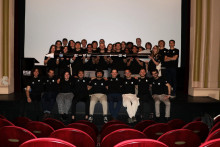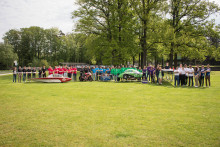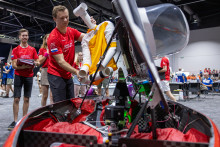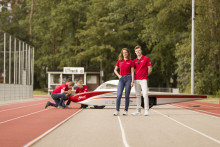RISE, which stands for 'Rocketry Innovations & Space Engineering', unveiled their latest rocket called TINA earlier this month. 'That stands for Thrust, Integrity, Navigation and Avionics,' says team manager and Industrial Engineering and Management student Majed Chahwan, who leads the student team of more than forty (primarily) part-timers.
Altitude and soft landing
Chahwan calls the rocket launch ‘a major milestone for the team this year’. ‘We are aiming for an altitude of eight hundred to a thousand meters. Plus, we hope for a soft landing in which the rocket suffers as little damage as possible,' says Chahwan. 'Whether all that will work out is of course very tense. There are a lot of variables involved in rocket science.'
The launch is mainly intended to test all technical systems, from propulsion to software. The previous rocket, MK4, reached an altitude of almost six hundred meters, according to Chahwan. That was last year, today the team hopes to reach even higher.
Three thousand meters
However, the students' big goal is even further away and even more ambitious: participation in EUROC, the 'European Rocketry Challenge' in Portugal. 'The upcoming edition this October comes too early. We want to participate and participate in the competition in 2026 to get as close as possible to an altitude of three thousand meters,’ says the team leader.
But before that happens, today's trial by fire awaits, followed by other tests this summer. 'Our goals include having a hopper vehicle; taking the rocket a short distance into the air and then land it again. We also go for a so-called fire static test. With such a test, we put the engine on a special stand that measures the thrust of the engine, to make sure it has the necessary force for the next generation rocket. Especially because we want to fly the rocket on sustainable biofuel,' says Chahwan.
No space technology
Not only team members are working on this. RISE's network has grown to dozens of sponsors from the business community, but the student team also offers minors and graduation projects. For example, a graduate recently worked on biofuel and a Saxion student designed the parachute. 'We are a university without a study programme in aerospace engineering like in Delft. That's a shame in a way. Actually, we are the ones who teach other aerospace engineering to fellow students.'
From part-time to full-time
After the summer, the team will change its structure. RISE was created in 2022 from students of the joint UT-VU programme in Mechanical Engineering. Since then, students have been working part-time on building rockets. Next academic year, the team will largely consist of about 25 full-time members from the UT, Saxion and VU Amsterdam. 'That is necessary to take the next step. We are still looking for some new members, especially for the non-technical positions,’ says the team leader. 'Ultimately, next year's team should build on all the previous work – and hopefully achieve a good result in Portugal in 2026.'






